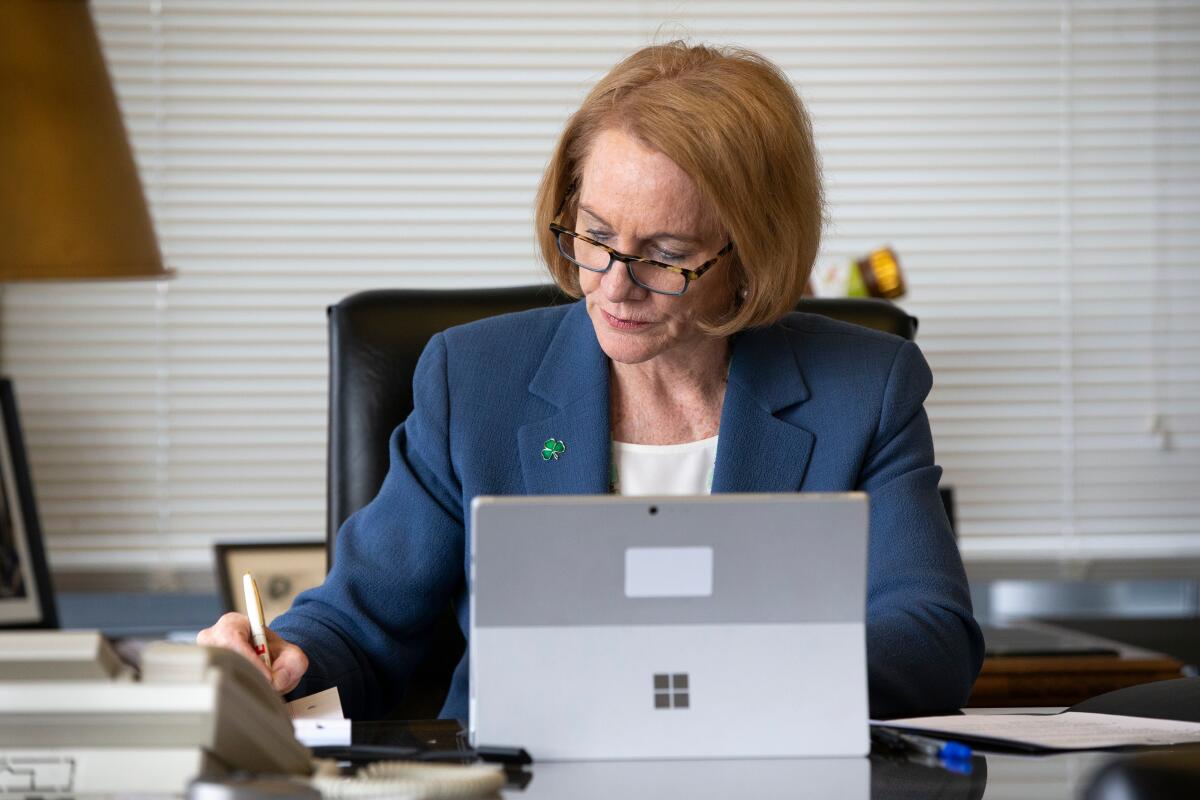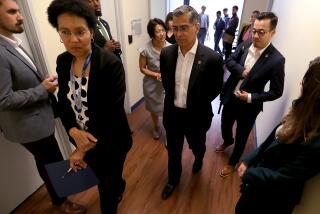Seattle mayor confronts grim coronavirus picture during online meeting in nearly empty office

- Share via
SEATTLE — With coronavirus bearing down on her city and state, Seattle Mayor Jenny Durkan held a video meeting with her department chiefs Tuesday that was extraordinary by any definition.
Durkan, wearing a blue blazer with a shamrock lapel pin and green necklace for St. Patrick’s Day, sat behind her large wooden desk in her corner office overlooking Elliott Bay.
A reporter and photographer stayed several feet away on strict instructions of a staff member, who had ushered them through offices vacated by the mayor’s telecommuting staff to wash hands before entering her office.
First up in the meeting was Laurel Nelson, interim director of the city’s Office of Emergency Management. She began with the latest numbers: three more COVID-19 deaths in King County as the Washington state total rose to 55.
Nelson also reported a major shortage of PPE — personal protective equipment — for first responders and hospital workers.
Of 600 requests to the Washington Emergency Management Division, “they have been able to deliver on 52 of those,” she said.
Next up was Seattle Fire Chief Harold Scoggins.
In light of the protective gear shortage, paramedics and emergency medical technicians were conserving gear by initially deploying only two people at a time — instead of four-member teams — to suit up and assess risky situations.
“The other side of that is we’re trying to reduce the number of firefighters who actually end up in quarantine or isolation because of these exposures” to coronavirus, he said.
Durkan leaned toward the computer screen.
“Hey chief, could I just stop you for a second?” she asked. “What is the current status on the availability for us for testing kits, the swabs and the vials?”
Scoggins replied that public health officials had promised to send 4,000 test kits a week for at least two weeks.
“When is that going to happen?” the mayor asked.
“Well, two days ago it was supposed to happen Tuesday, and now ...” Scoggins said.
“Like, today?” the mayor asked.
Yes, said Scoggins, adding: “That’s not just for Seattle, that’s for all of King County.”
Then Seattle Police Chief Carmen Best reported that managers learned on Monday night that a custodian in the department’s traffic unit had tested positive for the coronavirus. They arranged for disinfection of offices and quarantines for staff.
She also said that her department had contingency plans in case of civil unrest or imposition of a curfew.
Other department directors said that some owners of commercial kitchens that had been forced to close were volunteering to prepare food for homeless shelters or emergency needs.
Durkan, who said she had read a news article saying that residential compost could carry coronavirus, asked officials to consider whether all city garbage should be bagged from now on.
Financial department directors said emergency needs were draining city coffers, someday perhaps to be reimbursed by the federal government.
The mayor suggested that at least some money could be saved by suspending bus routes with few passengers, and shutting down the South Lake Union Streetcar, a trolley with European-style cars that wind through Amazon’s urban campus.
Seattle and Washington state officials have tried to slow the spread of the virus with increasingly draconian steps, closing schools and banning ever smaller gatherings of people. They could soon require residents to stay in their homes for anything but food shopping or emergencies.
But there’s a growing sense that whatever measures are taken won’t hold back a tidal wave of infections.
Durkan planned to continue the Cabinet calls each day. At the end of Tuesday’s video conference, which lasted less than an hour, she thanked her department heads.
“It’s unprecedented times,” she said. “We’re just going to have to power through it.”
More to Read
Sign up for Essential California
The most important California stories and recommendations in your inbox every morning.
You may occasionally receive promotional content from the Los Angeles Times.











